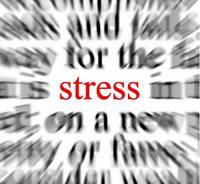 As a speaker and performance coach who travels the globe training corporate executives on how to be more resilient to stress, I see and hear a lot of common misconceptions when it comes to some of the best ways to handle stress.
As a speaker and performance coach who travels the globe training corporate executives on how to be more resilient to stress, I see and hear a lot of common misconceptions when it comes to some of the best ways to handle stress.
Mistake #1: Thinking stress is only in our heads. A lot of us may think of stress as something we feel – it’s mental, emotional or psychological. What we may forget or not even realize is that stress is also a physiological and chemical event that changes the chemistry of our bodies. Hormones are released that set off a cascade of physical adaptations which are designed to get us to respond to stress in the most meaningful way possible: physically. The stress response is specifically intended for fighting or fleeing – very physical events. Unfortunately, the nature of our technologically advanced, labor saving, sedentary environments don’t allow for many intense physical events to happen to burn off these stress hormones. The stress hormones continue to circulate throughout the body and can lead to weight gain, insomnia, reduced cognitive function, and lowered immunity.
Remedy: By getting short bursts of physical activity on a regular basis we’re mimicking the fight of flight response, which is how our bodies are designed to respond to stress. Cardiovascular interval training (short periods of intense work followed by short periods of recovery) burns off the stress hormones and releases hormones like endorphins and endocannabinoids, which make us feel good and restore balance.
Mistake #2: Cutting exercise from our schedules when things get crazy. When the demands of our lives increase, we look for things to cut out to reduce the level of our stress. Often times, exercise is the first to go. Based on what we just talked about in mistake #1, it’s one of the worst coping strategies we can make. We’re not burning off the stress hormones and restoring balance.
Remedy: The more your stress goes up, the more you need to exercise. I know you may be thinking that keeping or adding workouts may increase your level of stress, but stress is a physical event that needs to be remedied physically. Understand that exercise does not have to take an hour or 30 minutes – even a few minutes of intense cardiovascular interval training will give you benefits. Interval training is also one of the most effective and efficient ways of improving your fitness, as well as burning fat and calories. Another option is to break up your workouts into smaller bouts. Squeeze in 10 minutes in the morning and 10 minutes later in the day. Research shows it’s just as effective as one longer workout.
Mistake #3: Thinking stress is a bad thing. We’ve all been told to reduce or minimize the stress in our lives. To an extent this is true in that extreme amounts of stress or chronic levels can be very harmful. However, if we took all the stress away we would become weak, our bodies would atrophy, and we wouldn’t be able to withstand much. Stress is a good thing as long as it’s at the right intensity and we get periods of recovery.
Remedy: Embrace it and then find moments of recovery. Strategically exposing the body to greater levels of stress than we’re used to is how we increase fitness and strength. Over time we run faster or further. We gradually lift more weight. Our “rest days” between workouts are when the body actually adapts and grows stronger. During a crazy day a moment of recovery might be a minute of deep breathing, eating a healthy snack, or a few light stretches.
Mistake #4: Inadvertently adding stress to our bodies. What foods we eat, not eating enough, or eating too much can add a tremendous amount of stress on the body. When we’re stressed out we may reach for a cocktail, chocolate, a #4 with cheese, a cigarette, or – God forbid – all four. In reality, large amounts of alcohol, caffeine, nicotine, sugar, and dietary fat can all stimulate the stress response. Going too long without eating (generally 3-4 hours) stimulates the stress response. Eating too much also adds stress.
Remedy: Eat a moderate meal or small snack about every 3 hours, all day long. Every meal should contain a low fat source of protein, whole grains, and fresh fruits and/or vegetables. Choose snacks that are low glycemic (containing more fiber, protein and/or fat). Keep alcohol, caffeine and nicotine to a minimum, and drink plenty of water.
These simple strategies can go a long way in training your body and mind to be more resilient, which improves your performance on the job as well as in your personal life.

